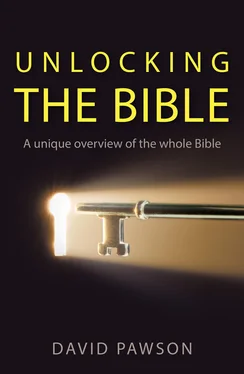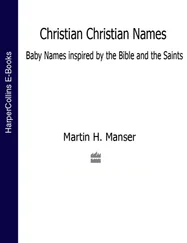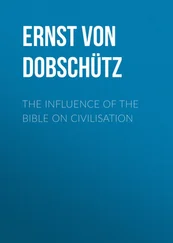A1 LEGACY FROM THE PAST
The whole of Israel faces a famine for three years. God tells David that the famine is a punishment on Israel for Saul’s earlier slaughter of the Gibeonites, a group whom the Israelites had vowed not to touch. The Gibeonites request the death of seven of Saul’s descendants as recompense for this outrage and David hands them over.
B1 DAVID’S MEN
There is a short account of David’s ‘giant killers’ – the men who fought alongside him and gave him victory over the Philistines in a series of battles.
C1 DAVID’S PSALM
One of David’s greatest psalms records how God delivered him from all his enemies. He writes of God as his rock, his fortress and his deliverer – the words of a man who can look back on God’s extraordinary provision throughout his life and give thanks for it.
C2 THE LAST WORDS OF DAVID
These sayings read like a psalm as David reflects on God’s Spirit, who inspired his writing of the songs which have been sung down through the ages and are perhaps David’s greatest legacy.
B2 MORE CITATIONS FOR BRAVERY
David recognizes, records and honours the men who fought with him, including the three who crept back to Bethlehem to bring David some water when he was on the run.
A2 DIVINE JUDGEMENT AGAIN FALLS ON ISRAEL
At the end of his life, David is tempted by Satan to conduct a census of the fighting men of Israel. His motivation is pride and God punishes his action. Gad the prophet is sent to convey God’s displeasure and David has three options: three years of famine, three months of fleeing from enemies, or three days of plague. He opts for the third and 70,000 people die of the plague.
David cries out to the Lord to stop the plague and is told to sacrifice at the threshing floor of Araunah the Jebusite, a flat area high above the city of Jerusalem. He offers a sacrifice and the plague stops. David sees the threshing floor as an ideal place to build a temple for God. He is offered the land free, but David says his offering to the Lord would be unworthy if it cost him nothing and insists on buying the land. The books of Kings describe the building of the temple on this very spot.
David was not allowed to build the temple himself because God said he had ‘blood on his hands’. The temple had to be built by a man of peace. So the temple in Jerusalem, which means ‘city of peace’, was built by David’s son Solomon. Although David drew up the plans, arranged the workmen and collected the materials, it was his son Solomon who saw the project through.
How should we read Samuel?
Our overview of Samuel has so far omitted any mention of how we should read the book. All readers approach the text with certain expectations, but it is important that we read the Bible as it was intended to be read if we are to understand and interpret it correctly. Samuel is no exception. There are six different levels at which we can read any series of Bible stories and it is important to choose the right one.
1. Anecdotal (interesting stories)
(i) Children
(ii) Adults
2. Existential (personal messages)
(i) Guidance
(ii) Comfort
3. Biographical (character studies)
(i) Individual
(ii) Social
4. Historical (national development)
(i) Leadership
(ii) Structure
5. Critical (possible errors)
(i) ‘Lower’ criticism
(ii) ‘Higher’ criticism
6. Theological (providential over-ruling)
(i) Justice – retribution
(ii) Mercy – redemption
1. Anecdotal
(I) CHILDREN
The simplest way is to focus on the most interesting stories. Sunday school teachers select the events that will communicate best with the children, and the story of David and Goliath, for example, is a particular favourite.
Maria Matilda Penstone expressed it like this:
God has given us a book full of stories
which was made for his people of old.
It begins with a tale of a garden
and finishes with the city of gold.
There are stories for parents and children,
for the old who are ready to rest,
but for all who can read them or listen
the story of Jesus is best.
There is some merit in using the stories in this way, but it is selective. Teachers can easily distort the true meaning of an event in favour of a platitude which they feel is of value and on a level which they think the children will understand.
(II) ADULTS
The stories in Samuel are superbly told, with an economy of words and a beautiful style. Since adults also enjoy a good story, many read the Bible purely for its anecdotal value. Film directors have enjoyed adapting stories such as David and Bathsheba for the silver screen.
While it is good that the stories are at least read, this approach ignores one fundamental point. At the level of anecdote, it does not matter whether stories are true or not. They could be fact, fiction or fable – whatever they are, the stories can still be enjoyed and the moral message can still be discerned. The big problem is, however, that it does matter whether the stories are true or not, because these smaller stories are part of the big story of the book of Samuel, which in turn has a crucial place within the Bible’s overall story of redemption. If we doubt whether men did the things attributed to them here, how can we be sure that God did what is attributed to him in these pages? The human and the divine acts stand or fall together.
2. Existential
(I) GUIDANCE
I am tempted to call reading the stories of the Bible for guidance ‘the horoscope method’, because some people read the Bible each day hoping that something might leap out and fit them! There are rare occasions when people have testified to a particular verse or passage having played a significant role in their lives, but this says more about God’s ability to use any means he chooses to guide us than it does about the legitimacy of the method. The method completely ignores the fact that most of the verses will mean nothing to a person’s particular situation. There is a classic story about a man who was thumbing through his Bible looking for a verse and found, ‘Judas went out and hanged himself.’ Not satisfied, he looked for another and found, ‘Go and do thou likewise’!
If we are reading the Bible for a personal message, what do we make of the verse in 1 Samuel where Samuel says to Eli, ‘In your family line there will never be an old man’? It was appropriate centuries later for one of Eli’s descendants, the prophet Jeremiah, who started his prophetic ministry when he was 17 since he would not live to old age. But there is no application for us. Or take another verse ‘…and Samuel hacked Agag to pieces before the Lord.’ How would this be applied?
I am ridiculing this method because I am sure that this should not be the main reason for reading these stories. The books of Samuel will reveal relatively little if this is how we read them. We need to read the text in the context in which it is written if we are to extract the correct meaning. If we just look for texts relevant to our own situation, we will miss an enormous amount.
(II) COMFORT
In former days ‘Promise Boxes’ were used by the devout in order to find encouragement to face life. Each biblical ‘promise’ was printed on a curled up roll of paper and one was lifted out at random with a pair of tweezers each day. Needless to say, each was also lifted out of its biblical context and therefore often separated from the conditions attached to it. For example, ‘Lo, I am with you always’ is placed in the context of ‘Go and make disciples’, and we should not claim the promise if we are not fulfilling the command. Even without such a box, we can read the Bible in much the same way, looking for a verse we can lift out for ourselves. We shall find few like this in the historical books of the Bible, like Samuel and Kings. They yield up their treasures to those who read them whole, seeking to know just what God is like, how he feels about us rather than how we feel about ourselves, or even about him.
Читать дальше











